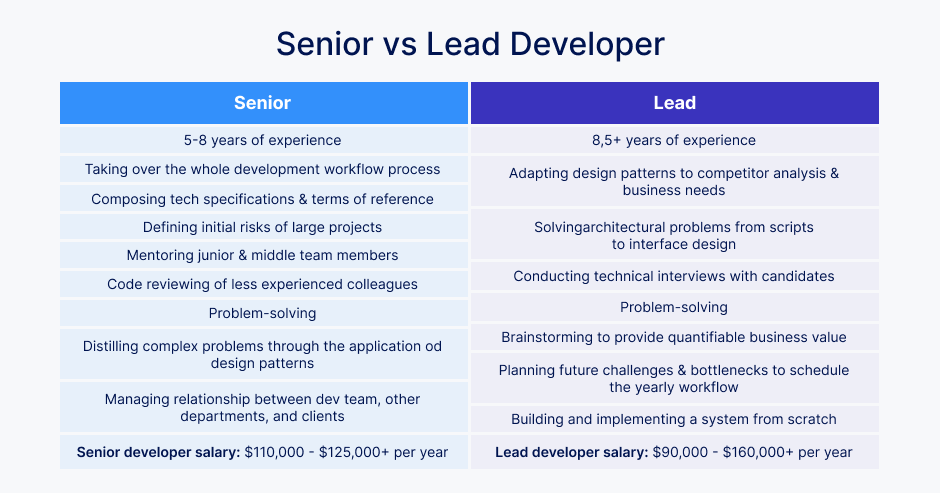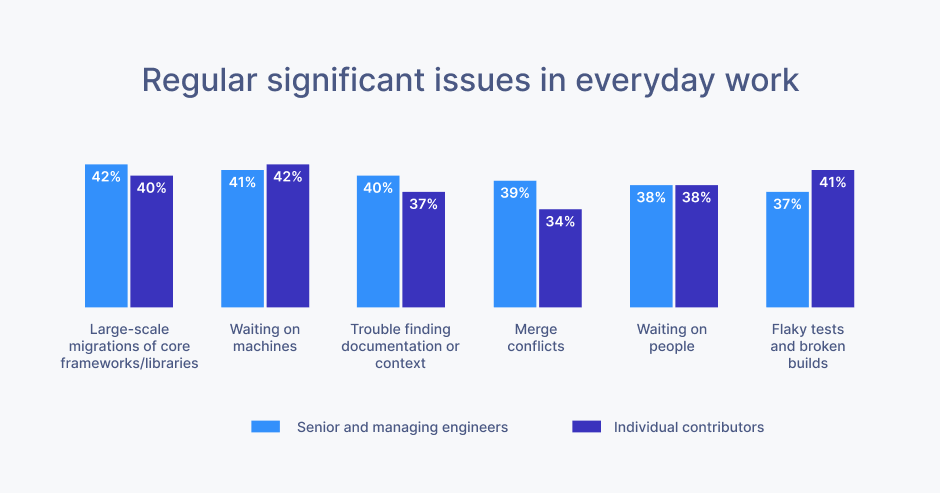In the tech world, job titles like 'Lead Engineer' and 'Senior Software Engineer' often cause confusion. People wonder if these roles are the same or if one is higher than the other. It all boils down to how a company defines these roles.

In this article, we'll break down what lead developers and senior developers do, and explain how they differ in their responsibilities and positions within a company.
What is a Senior Developer?
A senior developer is a software professional with extensive technical expertise and experience. Their primary role involves deep knowledge of specific technologies and programming languages, enabling them to tackle complex coding and technical tasks. As an integral part of a typical engineering team, senior developers often mentor and guide junior developers, sharing their insights and expertise to foster growth and development among their peers.
When looking for a senior developer, it's crucial to consider specific skills that set them apart. These include tech skills, problem-solving abilities, and strong communication skills. Technical skills are essential, as they demonstrate the developer's proficiency in various programming languages and technologies. Problem-solving abilities showcase their capacity to tackle complex challenges and find innovative solutions. Strong communication skills are vital, as they allow senior developers to effectively collaborate with their team and convey complex ideas to non-technical stakeholders.
Senior developers have promising career paths and growth opportunities. Their expertise and experience may lead to higher-level positions such as lead developers, technical leads, or even software architects. By continually expanding their technical knowledge and honing their soft skills, senior developers can advance their careers and contribute significantly to their teams' success.
What is a Lead Developer?
A lead developer is a seasoned software professional with a primary role focused on leadership and management. They are responsible for guiding a team of developers, overseeing the development process, and making critical technical decisions that set the direction for the team. As a key member of a typical engineering team, lead developers use their leadership and management skills to ensure the overall success of projects.
When considering a lead developer, it's essential to recognize the skills that differentiate them from other developers. Soft skills, strong communication and interpersonal abilities, and an aptitude for working effectively with stakeholders are crucial. Soft skills enable lead developers to motivate, coach, and lead their team to achieve goals. Strong communication and interpersonal skills allow them to collaborate seamlessly with team members, non-technical stakeholders, and clients, ensuring a smooth development process. The ability to work effectively with stakeholders ensures that projects align with business objectives and meet client expectations.
Lead developers have numerous growth opportunities in their career path. They may progress into roles such as technical directors, CTOs, or even executive-level management positions. By continually refining their leadership, management, and technical skills, lead developers can advance their careers and contribute significantly to their organization's success.
Main Differences between Senior and Lead Developers
Senior developers and lead developers exhibit both similarities and differences that shape their roles in the software development process, impacting project success.
One of the primary distinctions lies in their focus: senior developers emphasize technical expertise, excelling in specific technologies and coding tasks. In contrast, lead developers possess strong leadership and management skills, guiding the development process while delegating coding tasks to their team.
Their responsibilities diverge significantly regarding coding duties. Senior developers dedicate most of their time to writing code, whereas lead developers prioritize broader project aspects and technical decision-making, entrusting coding to their team members. The responsibilities of lead developers extend beyond coding, consuming less than 60% of their time on programming tasks. Their duties include project oversight, enhancing team productivity, and collaborating with other departments. Contrastingly, senior developers allocate 70% to 100% of their time to coding. Their focus revolves around writing code using specific programming languages tailored to the project's needs. Additionally, they collaborate with software architects to design software and conduct tests to ensure code functionality.
Their approaches to processes and team management further differentiate them. Senior developers thrive within established processes, fostering collaboration with peers. On the other hand, lead developers maintain a broader perspective, adjusting processes for improved efficiency and elevating team performance.
Additionally, their engagement levels with departments and stakeholder management vary. Senior developers mentor and share knowledge within their teams, whereas lead developers liaise across departments and manage stakeholder expectations to align projects with business objectives and client needs.
Recognizing these distinctions is vital for assembling effective software development teams. Understanding the unique skills and responsibilities of senior and lead developers enables organizations to make informed decisions when recruiting and expanding their teams.
Seeking long-term, high-paying remote jobs? Sign up now and get connected with premier US enterprises, startups, and projects →
Main Similarities between Senior and Lead Developers
Despite the differences in their roles and responsibilities, senior developers and lead developers share some key similarities. Both professionals play crucial roles in the development process, contributing to the success of projects by bringing their unique skills and expertise to the table.
Both senior and lead developers require a strong foundation in technical skills, as their roles demand in-depth knowledge of various technologies and programming languages. This solid technical background enables them to collaborate effectively with their team members, solve complex problems, and ensure the development process runs smoothly.
Effective communication skills are also vital for both senior and lead developers. These skills allow them to convey complex technical concepts to non-technical stakeholders, collaborate with team members and other departments, and manage client expectations. According to various surveys and statistics, effective communication is a key factor in successful software projects, highlighting the importance of this skill for both roles.
In conclusion, understanding the main similarities between senior and lead developers is important for building strong, well-rounded software development teams. By recognizing their shared strengths and expertise, organizations can foster collaboration and ensure project success.
Also read: 10 programming languages that will land you a salary of $100k in the US
Transitioning from a Senior Developer to a Lead Developer
When senior developers choose to pursue a lead developer role, they must be prepared to take on more responsibilities and manage a team. This transition requires developing leadership and management skills, which are essential for overseeing the development process and guiding team members effectively. According to various surveys and statistics, strong leadership and management skills significantly contribute to the success of software projects.
As senior developers move into a lead developer role, they must strike a balance between their technical expertise and team management responsibilities. While their technical skills remain crucial for the role, lead developers must also focus on motivating and coaching their team, making critical technical decisions, and collaborating with stakeholders to ensure project success. This shift in focus may be challenging initially, but it ultimately leads to personal and professional growth, enabling senior developers to expand their horizons and contribute significantly to their organization's success.
In summary, transitioning from a senior developer to a lead developer involves embracing new responsibilities, honing leadership and management skills, and finding the right balance between technical expertise and team management. By doing so, software professionals can successfully navigate this career path and make a significant impact on their teams and projects.
Also read: Decoding the CTO career path: Learnings from Index.Academy #5 session

Hiring Senior and Lead Developers: Best Practices
When hiring senior and lead developers, it's crucial to look for traits beyond hard skills, as soft skills such as communication, leadership, and adaptability are equally important for successful project outcomes. According to various surveys and statistics, considering these traits in the hiring process results in more effective software development teams.
Another best practice is to consider hiring remote software engineers from Central Eastern Europe (CEE). This region has become a global hotspot for talented tech developers, offering organizations a competitive advantage, access to high-quality talent, and cost optimizations. Top-tier STEM education, a thriving tech ecosystem, and excellent communication skills make CEE developers an attractive option for companies looking to scale their software teams.
Also read: Vetting High-Performing Tech Talent: Our Rigorous 4-Step Process
Index.dev is a platform that matches remote CEE software engineers with projects at leading startups and enterprises. With its rigorous vetting process, Index.dev ensures the best matches for employers and developers, evaluating qualifications, eligibility, background checks, screening interviews, technical assessments, and more. By using Index.dev, organizations can access a curated network of top software engineers, simplifying the hiring process and promoting project success.